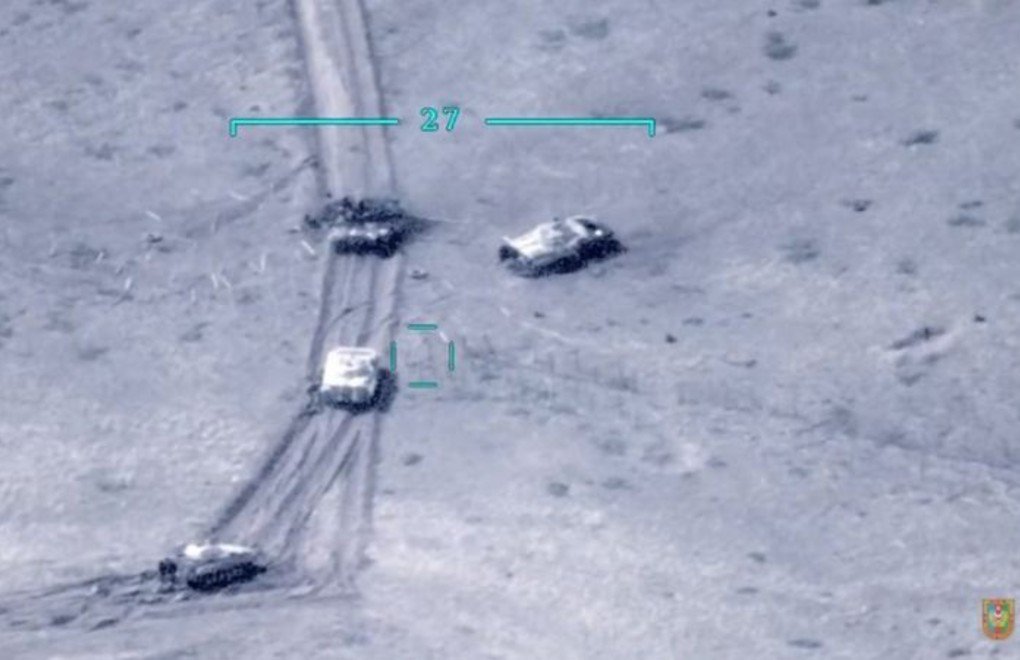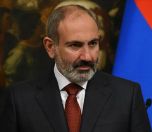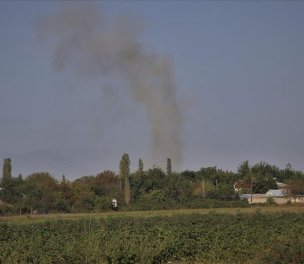Azerbaijan's Defense Ministry released footage of drone strikes on Armenian military.
Click to read the article in Turkish (1) (2) (3) (4)
Clashes started yesterday (September 27) between Armenia and Azerbaijan over the disputed Karabakh region.
While both sides accuse each other of violating the ceasefire in the area, other countries and international organizations have called Yerevan and Baku to end the clashes.
The Upper Karabakh administration announced that it lost 31 soldiers while Azerbaijan stated that Armenia's attacks caused civilian casualties.
Azerbaijan today issued a "final warning" to Armenia, which it said was continuing to "attack civilian settlements."
"The Ministry of Defense gives the last warning to Armenia that adequate retaliatory measures will be taken against them if needed," it said, according to Turkey's state-run Anadolu Agency (AA).
Shushan Stepanyan, the spokesperson of the Ministry of Defense of Armenia, said today on her Facebook page that "Early in the morning, Azerbaijan resumed its offensive operations, using artillery, armored vehicles, including the 'TOS' heavy artillery system," news.am reported.
"The Armenian subdivisions firmly have been repelling encroachments of the Azerbaijani subdivisions, undertaking appropriate actions, causing significant losses of the adversary's personnel and equipment," Stepanyan added.
Amidst the clashes, both countries declared martial law in some areas.
"At the decision of the Government, martial law and general mobilization is being declared in the Republic of Armenia. I call on the personnel attached to the troops to present themselves to their district commissariats," Armenia's PM Nikol Pashinyan said on Twitter yesterday.
Azerbaijan's President Ilham Aliyev also declared general mobilization yesterday.
The Nagorno-Krabakh disputeRelations between the two former Soviet nations have been tense since 1991 over Upper Karabakh, an internationally recognized territory of Azerbaijan. Four UN Security Council and two UN General Assembly resolutions as well as many international organizations demand the withdrawal of the occupying forces. The OSCE Minsk Group – co-chaired by France, Russia and the US – was formed in 1992 to find a peaceful solution to the conflict. A cease-fire was agreed upon in 1994. France, Russia and NATO, among others, have urged an immediate halt to clashes in the occupied region. |
International reactions
US President Donald Trump said Sunday that the US is looking into what can be done to stop the violence between Armenia and Azerbaijan over the occupied Nagorno-Karabakh region.
Trump told reporters at a White House press conference that the US has "a lot of good relationships in that area. We will see if we can stop it."
UN Secretary-General Antonio Guterres on Sunday urged Azerbaijan and Armenia to immediately end clashes in the Upper Karabakh or Nagorno-Karabakh region.
Condemning the use of force and civilian deaths, Guterres called on the parties to immediately stop fighting, de-escalate tensions and return to "meaningful" negotiations without delay, his spokesman said in a statement.
The statement also said that Guterres will speak by phone with Azerbaijani President Ilham Aliyev and Armenian Prime Minister Nikol Pashinyan.
The US State Department also called on the two countries to immediately end clashes in a statement.
"The United States is alarmed by reports of large-scale military action along the Line of Contact in the Nagorno-Karabakh conflict zone that has resulted in significant casualties, including civilians. We extend our condolences to the families of those killed and injured," the statement said.
"The United States condemns in the strongest terms this escalation of violence."
The statement stressed that Deputy Secretary Stephen Biegun called Azerbaijan's Foreign Minister Jeyhun Bayramov and Armenia's Foreign Minister Zohrab Mnatsakanyan "to urge both sides to cease hostilities immediately, to use the existing direct communication links between them to avoid further escalation, and to avoid unhelpful rhetoric and actions that further raise tensions on the ground."
"The United States believes participation in the escalating violence by external parties would be deeply unhelpful and only exacerbate regional tensions.
"We urge the sides to work with the Minsk Group Co-Chairs to return to substantive negotiations as soon as possible. As a Co-Chair of the OSCE Minsk Group, the United States remains committed to helping the sides achieve a peaceful and sustainable settlement to the conflict," it added.
Middle East and Asia
The Middle East and Asian countries expressed concern over escalating hostilities after Armenian forces shelled Azerbaijani military and civilian positions in the occupied Upper Karabakh, or Nagorno-Karabakh region.
Iran also called on Azerbaijan and Armenia to end the conflict and start talks.
Tehran is keeping a close watch on the conflict with concern, said Foreign Ministry spokesman Saeed Khatibzadeh.
Iran is ready to use all its capacities to establish a cease-fire and start talks between the two sides, Khatibzadeh noted.
Pakistan threw its weight behind Azerbaijan following Armenia's border violations and attacks in Upper Karabakh.
"Pakistan stands with the brotherly nation of Azerbaijan and supports its right of self-defense," the Foreign Ministry said in a statement.
"We support Azerbaijan's position on Nagorno-Karabakh, which is in line with several unanimously adopted UN Security Council resolutions," it added.
Kazakhstan called on Yerevan and Baku to end the conflict, the country's Foreign Ministry said in a statement.
Expressing its deep concern, the ministry said Nur-Sultan urges the two countries to take all measures to stabilize the situation and start a dialogue.
Kazakhstan's international organizations are also ready to help in seeking peaceful ways to end the conflict, the statement added. (RT/VK)







-132.jpg)
_(1)sa.jpg)